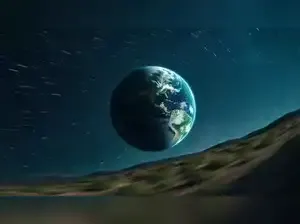Earth is spinning faster and scientists fear a Y2K-like Doomsday
ET Online | July 23, 2025 2:22 AM CST

Synopsis
Earth's accelerating spin is causing concern among scientists due to potential disruptions to global timekeeping systems. July 10 marked the shortest day of the year, and more are expected, potentially requiring a negative leap second by 2035. This unprecedented move could trigger widespread system failures, reminiscent of the Y2K scare, although climate change is temporarily mitigating the speed-up.
Earth is spinning faster than usual this summer, raising concerns among scientists about potential disruptions to global timekeeping systems — with fears reminiscent of the Y2K scare. According to a CNN report citing data from the International Earth Rotation and Reference Systems Service and the US Naval Observatory, July 10 was the shortest day of the year so far, clocking in 1.36 milliseconds under the standard 24 hours. More short days are expected on July 22 and August 5.
The Earth's rotation isn't perfectly consistent. Factors like lunar gravitational pull, seasonal atmospheric shifts, and the motion of the planet’s liquid core cause slight variations in the length of a day. While the changes are typically imperceptible in daily life, even millisecond discrepancies can affect technologies that rely on hyper-accurate timing — such as telecommunications, satellite systems, and financial networks.
To maintain precise time, atomic clocks — which have been used since 1955 — track time to an extraordinary level of accuracy. Coordinated Universal Time (UTC), used worldwide, is based on atomic clocks. If Earth's rotation falls out of sync with UTC, leap seconds are added to bring them back into alignment — a process that’s occurred 27 times since 1972. However, as Earth’s spin has been accelerating, no leap second has been added since 2016.
Scientists are now warning that a negative leap second — subtracting a second instead of adding one — may be required as early as 2035. “There’s never been a negative leap second,” physicist Judah Levine told CNN, but the chances of it happening are now around 40%. Such a move could wreak havoc, especially since many systems still struggle with positive leap seconds even after five decades. A negative leap second, never before implemented, could cause failures across systems that depend on stable, continuous time — evoking comparisons to the Y2K bug.
Interestingly, climate change may be buying time. The CNN article, citing a study published last year by Agnew in the journal Nature, claimed that melting ice in Greenland and Antarctica is redistributing mass across the planet, subtly slowing Earth’s spin and counteracting the speed-up.
Benedikt Soja, an assistant professor at The Swiss Federal Institute of Technology in Zurich, Switzerland, told CNN that if warming continues, "the effect of climate change could surpass the effect of the moon, which has been really driving Earth’s rotation for the past few billions of years.”
“I think the (faster spinning) is still within reasonable boundaries, so it could be natural variability...Maybe in a few years, we could see again a different situation, and long term, we could see the planet slowing down again. That would be my intuition, but you never know,” Soja added.
The Earth's rotation isn't perfectly consistent. Factors like lunar gravitational pull, seasonal atmospheric shifts, and the motion of the planet’s liquid core cause slight variations in the length of a day. While the changes are typically imperceptible in daily life, even millisecond discrepancies can affect technologies that rely on hyper-accurate timing — such as telecommunications, satellite systems, and financial networks.
To maintain precise time, atomic clocks — which have been used since 1955 — track time to an extraordinary level of accuracy. Coordinated Universal Time (UTC), used worldwide, is based on atomic clocks. If Earth's rotation falls out of sync with UTC, leap seconds are added to bring them back into alignment — a process that’s occurred 27 times since 1972. However, as Earth’s spin has been accelerating, no leap second has been added since 2016.
Scientists are now warning that a negative leap second — subtracting a second instead of adding one — may be required as early as 2035. “There’s never been a negative leap second,” physicist Judah Levine told CNN, but the chances of it happening are now around 40%. Such a move could wreak havoc, especially since many systems still struggle with positive leap seconds even after five decades. A negative leap second, never before implemented, could cause failures across systems that depend on stable, continuous time — evoking comparisons to the Y2K bug.
Interestingly, climate change may be buying time. The CNN article, citing a study published last year by Agnew in the journal Nature, claimed that melting ice in Greenland and Antarctica is redistributing mass across the planet, subtly slowing Earth’s spin and counteracting the speed-up.
READ NEXT
-
Rupee Slips 2 Paise To 86.40 Against US Dollar In Early Trade

-
WI vs AUS 2025 2nd T20: Australia spoil Andre Russell’s farewell party, Josh Inglis and Cameron Green give Aussies 2-0 lead

-
Good news for employees of THESE companies as they emerge as India’s top…, Ratan Tata’s company lead as…, Mukesh Ambani’s Reliance at…

-
This country’s GDP jump by 30 percent overnight, becomes fourth-largest economy in…, its not China, US, Japan, the name is…

-
OnePlus To Unveil New Tablet In India Tomorrow, Likely To Be Pad Lite
